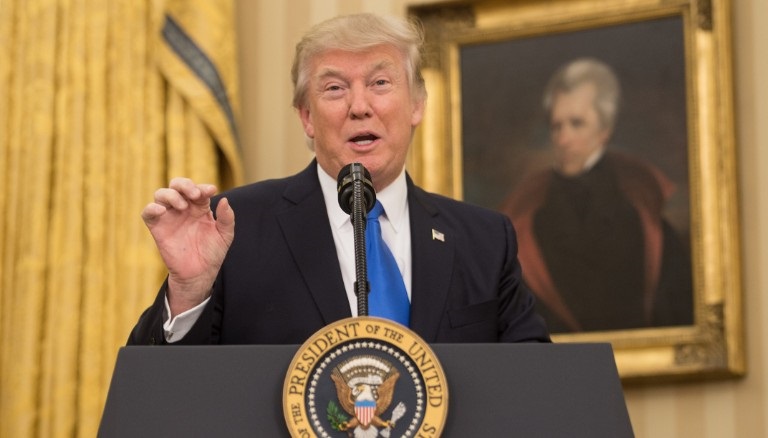The controversial travel ban introduced by US President Donald Trump will be partially implemented after a ruling by the Supreme Court.
Trump will be allowed to forge ahead with a limited version of his ban on travel from six mostly Muslim countries to the US.
The president hailed the decision as a “victory for national security,” but it’s likely to set off a new round of court disputes over anti-terror efforts and religious discrimination.
The justices will hear full arguments in October in the case that has stirred heated emotions across the nation and pointed rebukes from lower courts saying the administration is targeting Muslims. Until then, the court said Monday, Trump’s ban on visitors from Iran, Libya, Somalia, Sudan, Syria and Yemen can be enforced if those visitors lack a “credible claim of a bona fide relationship with a person or entity in the United States.”
The ruling sets up a potential clash between the government and opponents of the ban over the strength of visitors’ ties to the United States. A senior official said plans already had been written to enforce the ban aggressively. But immigrant groups said relatively few people try to enter the United States without well-established ties.
Those groups said they will be sending lawyers and monitors back to American airports, where the initial, immediate implementation of the ban in January caused chaos and confusion.
State Department spokeswoman Heather Nauert said the ban would be implemented starting 72 hours after being cleared by courts. That means it will take effect Thursday morning.
The president has denied that the ban targets Muslims but says it is needed “to protect the nation from terrorist activities” committed by citizens of the six countries. All six have been designated as presenting heightened concerns about terrorism and travel to the United States.
The 90-day ban is necessary to allow an internal review of screening procedures for visa applicants from the countries, the administration says. That review should be complete before October 2, the first day the justices could hear arguments in their new term.
The ban will have run its course by then, raising a question of whether the justices will even issue a decision in the case or dismiss it because it has been overtaken by events.
The court asked both sides to address the issue of timing, along with questions about whether the ban is aimed at Muslims, the impact of Trump’s provocative campaign statements and federal courts’ authority to restrain the president in the area of immigration.
A 120-day ban on refugees also is being allowed to take effect on a similar, limited basis.
Three of the court’s conservative justices said they would have let the administration apply the bans without the limits imposed by their colleagues.
Justice Clarence Thomas, joined by Samuel Alito and Neil Gorsuch, said the government has shown it is likely to win the legal case in the end. Thomas said the government’s interest in preserving national security outweighs any hardship to people denied entry into the country.
Trump’s administration’s implementation plans, largely orchestrated by White House adviser Stephen Miller, focus on refusing entry to people who are unable to show a substantial and pre-existing tie to a person or institution in the United States.
But some immigration lawyers said relatively few people would fall under the ban because people coming to study, work or visit family members already have sufficient relationships with others already is in the country.
The 4th US Circuit Court of Appeals in Richmond, Virginia, said the ban was “rooted in religious animus” toward Muslims and pointed to Trump’s campaign promise to impose a ban on Muslims entering the country as well as tweets and remarks he has made since becoming president.
On Monday, a federal judge halted the deportation of all Iraqi nationals detained during immigration sweeps across the US this month until at least July 10, expanding a stay he imposed last week.
The stay had initially only protected 114 detainees from the Detroit area.
US District Judge Mark Goldsmith sided with lawyers from the American Civil Liberties Union who filed an amended complaint on Saturday seeking to prevent Immigration and Customs Enforcement (ICE) from deporting Iraqis from anywhere in the United States.
The ACLU argued those being deported could face persecution, torture, or death because many were Chaldean Catholics, Sunni Muslims, or Iraqi Kurds and that the groups were recognized as targets of ill-treatment in Iraq.
Goldsmith agreed with the ACLU on the grave consequences deportees may face, writing in his seven-page opinion and order that: “Such harm far outweighs any interest the Government may have in proceeding with the removals immediately.”
On Thursday, Goldsmith ordered a stay in the Michigan Iraqis’ deportation for at least two weeks while he decided whether he had jurisdiction over the merits of deporting immigrants who could face physical danger in their countries of origin.
He expanded his stay on Monday to the broader class of Iraqi nationals nationwide, saying it applies to the removal of all Iraqi nationals in the United States with final orders of removal who have been or will be detained by ICE.
There are 1,444 Iraqi nationals who have final deportation orders against them, although only 199 of them were detained as part of a nationwide sweep by immigration authorities, federal prosecutors said in court on Monday.
Those detained had convictions for serious crimes, including rape and kidnapping, ICE said.
Goldsmith also said his stays were designed to give detainees time to find legal representation to appeal against their deportation orders, and to give him time to weigh the question of his jurisdiction.
